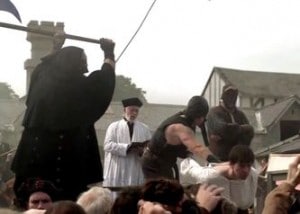 On this day in 1541, Thomas Culpeper, Gentleman of the Privy Chamber, and Francis Dereham, secretary to Queen Catherine Howard, were executed at Tyburn. They had been found guilty of treason on 1st December at a trial at London’s Guildhall and sentenced to the usual traitor’s death. Although both men petitioned the King to commute their sentence to beheading, only Culpeper was successful; Dereham was hanged, drawn and quartered.
On this day in 1541, Thomas Culpeper, Gentleman of the Privy Chamber, and Francis Dereham, secretary to Queen Catherine Howard, were executed at Tyburn. They had been found guilty of treason on 1st December at a trial at London’s Guildhall and sentenced to the usual traitor’s death. Although both men petitioned the King to commute their sentence to beheading, only Culpeper was successful; Dereham was hanged, drawn and quartered.
Why were they executed?
In November 1541, Archbishop Thomas Cranmer had been made aware of Queen Catherine Howard’s colourful past, the fact that she had “lived most corruptly and sensually” while in the care of the Dowager Duchess of Norfolk. While investigating this claim, Cranmer, Wriothesley and Fitzwilliam found that Catherine had had sexual relations with Francis Dereham, a man who was not acting as her secretary, and that they had referred to each other as husband and wife. In her letter of confession to her husband, the King, Catherine wrote:
“finally he [Dereham] lay with me naked, and used me in such a sort as a man doth his wife many and sundry times, but how often I know not, and our company ended almost a year before the Kings Majesty was married to my lady Anne of Cleves.”
During his interrogation, Dereham told of how Thomas Culpeper, a favourite of the King, “had succeeded him in the Queen’s affections” and it was then found that Catherine and Culpeper had enjoyed secret assignations, helped by Jane Boleyn, Lady Rochford. Both Catherine and Culpeper denied having a sexual relationship, but Culpeper admitted that “he intended and meant to do ill with the Queen and that in like wise the Queen so minded to do with him”. The couple were, therefore, guilty of treason under the 1534 Treason Act which defined traitors as those who “do maliciously wish, will or desire, by words or writing, or by craft imagine, invent, practise, or attempt any bodily harm to be done or committed to the king’s most royal person, the queen’s, or their heirs apparent”.
Charles Wriothesley, the Tudor Chronicler, recorded the men’s executions:
“Culpeper and Dereham were drawn from the Tower of London to Tyburn, and there Culpeper, after an exhortation made to the people to pray for him, he standing on the ground by the gallows, kneeled down and had his head stricken off; and then Dereham was hanged, membered, bowelled, headed, and quartered [and both] their heads set on London Bridge.”
Catherine Howard and Lady Rochford were executed on 13th February 1542.